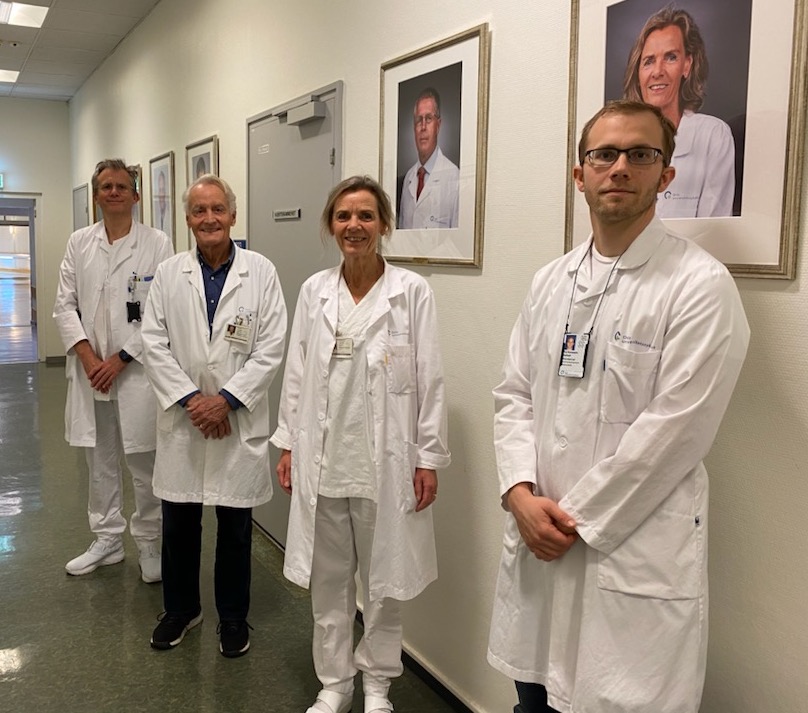The OMEMI trial achieves international publicity
The OMEMI trial (OMega-3 fatty acids in Elderly patients with Myocardial Infarction) conducted from Center for Clinical Heart Research (CCHR), Department of Cardiology, OUS Ullevål, has achieved international publicity.
The study was presented as a "Late Breaking Trial" at the American Heart Association (AHA) Scientific Session 2020, with simultaneous publication in the prestigious journal Circulation.
The possible effect of supplementation with the marine omega-3 polyunsaturated fatty acids eicosapentaenoic acid (EPA) and docosahexaenoic acid (DHA) (n-3 PUFA), in the prevention and treatment of patients with cardiovascular disease, especially coronary heart disease has been debated in the last decades with controversial results, depending on study population, choice of supplement, dosage, time frame, choice of placebo and measures of patient adherence to the study drug.
The OMEMI trial was planned and started in 2012, based on previous studies with n-3 PUFA at CCHR. It was an investigator-initiated, randomized, double-blind, placebo-controlled multicenter study which included patients 70-82 years old with a recent myocardial infarction (MI), recruited from OUS, Ullevål, Akerhus University Hospital, Vestre Viken Bærum Hospital and Stavanger University Hospital. Patients were followed for 2 years. Primary outcome was a composite of myocardial reinfarction, unscheduled revascularization, stroke, hospitalization for new heart failure and all-cause death. Secondary outcome was new onset of Atrial Fibrillation (AF). Of special note is that compliance/adherence was measured by levels of fatty acids in serum phospholipids.
The n-3 PUFA group received 1.8 g/day (3 capsules) and the placebo group received the same dosage of corn oil. Of the 1027 included patients, 1014 had full sets of relevant data and were subjected to intention-to-treat analysis.
Primary end-point was recorded in 210 patients, 108 in the active n-3 PUFA group and 102 in the placebo group with no statistical difference. There were neither any differences in the single components of the primary outcome nor related to a variety of risk factors for MI in the study population. Levels of EPA increased about 100% more in the n-3 PUFA group compared to placebo, indicating good adherence to the treatment allocation.
The secondary outcome of new episodes of AF showed an increased incidence in the n-3 PUFA group when compared to placebo of borderline significance (p=0.06), in contrast to our initial hypothesis.
It should be noted that the supplementation was on top of modern post-infarction treatment, i.e. statins, double anti platelet therapy, betablockers and other antihypertensive treatment.

PhD student Sjur Tveit and the former PhD students Kristian Laake and Peder Myhre were not present.
The study was supported by grants from Stein Erik Hagen Foundation for Clinical Heart Research, Oslo, Norway, Olav Thons Foundation, Oslo, Norway and Tom Wilhelmsen Foundation, Oslo, Norway. Study medication and placebo were sponsored by Orkla Health, Oslo Norway, which had no impact on any part of the study.
Links:
The article:
Effects of n-3 Fatty Acid Supplements in Elderly Patients after Myocardial Infarction: A Randomized Controlled Trial.
Kalstad AA, Myhre PL, Laake K, Tveit SH, Schmidt EB, Smith P, Nilsen DWT, Tveit A, Fagerland MW, Solheim S, Seljeflot I, Arnesen H; OMEMI investigators.
Circulation. 2020 Nov 15. doi: 10.1161/CIRCULATIONAHA.120.052209. Online ahead of print.
PMID: 33191772
Comments to the results:
From World News Today:
Omega-3 does not protect against heart disease in elderly patients
From Verdens Gang (VG), major national newspaper (in Norwegian):
Ny studie: Omega-3 beskytter ikke mot hjertesykdom hos eldre pasienter
Center for Clinical Heart Research (CCHR) home page at OUS
